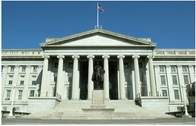Advertisement
Interthinx contacts U.S. Secretary of the Treasury

Interthinx, a provider of proven risk mitigation, mortgage fraud prevention and regulatory compliance tools for the mortgage industry, has sent a package to the U.S. Secretary of the Treasury, Congress, and political leaders in various states, indentifying several key issues that government leaders must address if they hope to correct the problems plaguing the U.S. mortgage industry.
“Now that loan volume has significantly decreased and the mortgage industry must refocus on the quality of mortgage loans, many now understand how fraud could have and should have been prevented with the use of readily available, proven technologies before loans were funded,” said Kevin Coop, president of Interthinx. “Tightened underwriting standards and increased documentation requirements are not preventing fraud; they’re only encouraging more creative schemes and falsified documents as the incidence of fraud continues to rise. It may be time for the government to require certain technology to mitigate this multibillion-dollar problem.”
In its package, Interthinx outlines its experience as a leading developer of technology to identify fraud in the mortgage transaction. It also touches on the company’s efforts to build awareness of the potential problem of foreclosure rescue scam artists as early as 2007. In addition, each package includes a reference to a white paper entitled “Burning Down the House: Mortgage Fraud and the Destruction of the U.S. Economy.” The paper, presented this spring by Interthinx vice president Ann Fulmer at the National Institute of Justice Conference on Foreclosures, Mortgage Fraud and Crime, delineates problems caused by fraud and details a solution built around a uniform fraud prevention protocol.
“Mortgage fraud is robbery without a gun,” said Fulmer. “We have the means to defend ourselves, the mace so to speak. We just need everyone in the industry, including the government, to become aware of it. With the US government now the largest investor in American mortgage debt, we owe mandatory prevention efforts to every taxpayer.”
Interthinx provides the following excerpt from the letter by Kevin Coop included in its package, “It is clear that in the absence of robust fraud prevention protocols, government stabilization and stimulus program funds are being drained from their intended purpose into criminal profits. With foreclosures up and more adjustable rate mortgage resets still to come, criminals will no doubt continue to take advantage of struggling homeowners and look for lenders with penetrable, or nonexistent, fraud detection programs. At Interthinx, we are firm believers that the economic crisis will not end until the quality of loan originations is assured.”
For more information, visit www.interthinx.com.
About the author





